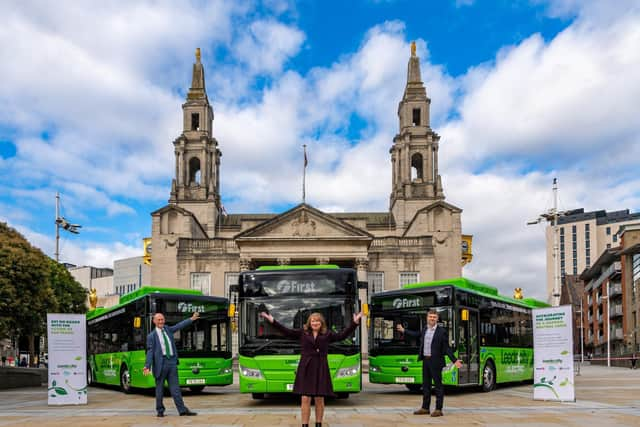Leeds clean air charging zone 'may still be needed if congestion levels keep rising'
In the week the first electric buses were introduced into Leeds, West Yorkshire Combined Authority's Transport Committee chair Kim Groves said city leaders could not get complacent about the fall in pollution during lockdown.
Plans for clean air zones in Leeds and Sheffield, where polluting vehicles have to pay to enter, have been put on hold because they were no longer deemed necessary as traffic levels had fallen dramatically.
Advertisement
Hide AdAdvertisement
Hide AdBut Coun Groves, whose organisation has been working with bus operators to promote their use locally. said that congestion levels had now risen to just 13 per cent below pre-pandemic levels.
And she said: "So already those journeys have started to creep back and for people's health, that is really significant and a problem and it's something that we're going to have to politically face as a country.
"Nationally there's going to have to be some strong policies come out, otherwise within months, we're going to be going back to implementing a clean air zone."
The first electric buses were introduced in Leeds this week, making it one of only three cities in the UK with York and Glasgow where First is currently using the vehicles.


Advertisement
Hide AdAdvertisement
Hide AdThe nine Yutong E10 electric vehicles are supplied by Pelican Coach & Bus, a family-owned engineering company based in Castleford which is the exclusive distributor in the UK for the Chinese-made buses.
Paul Matthews, Managing Director of First Bus West Yorkshire, said the work done in Leeds to make it easier for buses to get around has been a "role model" for other areas.
But he said: "It can't stop there and I think that's the concern, it's not something you just do and tick a box and then breathe a huge sigh of relief because then the next increment in congestion happens.
"So you then have to think about what are the next plans and actually probably the next plan will have to be even more radical, and more perhaps politically difficult.
Advertisement
Hide AdAdvertisement
Hide Ad"So, we are on the journey, Leeds has made a great start, I think there's a bit of catching up to do in Bradford, but it is a constant journey and I don't think we will ever get the ultimate until such time as people do not want to get the car to travel."
Across West West Yorkshire, 479 buses have been retrofitted with cleaner technology to reduce harmful emissions, representing nearly 50 per cent of the total.
And Coun Groves said these efforts had to be "just the start" because "we're in a race against the private vehicle, in terms of decarbonising transport".
She said: "What we need to do is make sure that the bus journey is far more efficient, that the journey times are shorter, and that means reallocating road space as we have done, just as with the recent funding on cycling and walking, to bus."
Comment Guidelines
National World encourages reader discussion on our stories. User feedback, insights and back-and-forth exchanges add a rich layer of context to reporting. Please review our Community Guidelines before commenting.